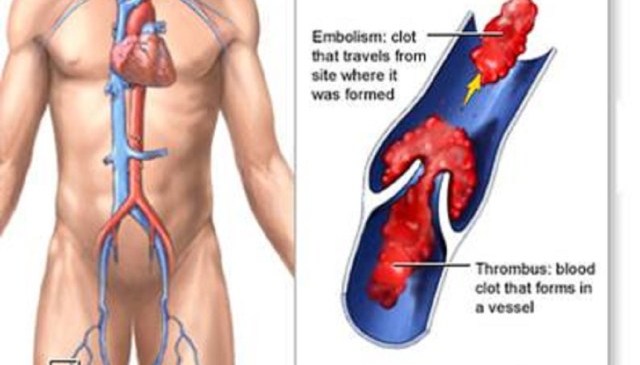The News Agency of Nigeria (NAN) reports that World Thrombosis Day is marked annually on Oct. 13 and it focuses attention on the often overlooked and misunderstood condition of thrombosis, an urgent and growing health problem. Some people known to have passed on from thrombosis include actor James Stewart, Rapper Heavy D and Nigerian Star, Goldie Harvey, who died after returning from the 55th Grammy Awards in 2013.
Akanmu said “when the blood clot forms in the vein, it is referred to as Deep Vein Thrombosis (DVT). “Part or whole of the clot can detach and travel in the circulation to lodge in the lungs, causing a condition referred to as pulmonary embolism (PE). Both DVT and PE are collectively referred to as “Venous Thromboembolism” (VTE). “Travellers, particularly air travelers, are more particularly associated with Venous Thromboembolism. “This occurs especially in individuals who already have inherited or genetic predisposition of thrombosis.’’ According to him, the environment in the economy class makes this happen, especially the environment up in the sky.
“Generally in the sky, the pressure there is completely different from the one on the surface and this makes us, while in the sky, to lose more fluids. “People become more dehydrated, which is what we call Low Blood Viscosity, which means resistance to flow, the flow of blood becomes more sluggish and the sluggishness predisposes to thrombosis.’’ The hematologist said that passengers in the Economy class of an aircraft were usually clamped and they don’t do “ Air Exercise’’. He also advised air travelers to take water intermittently while on-air and take less alcohol.
“The location where the thrombus occurs is at the back of the knee and that is where we have a popliteal vein. “Nearly 90 to 95 percent of air travelers in economy class would have thrombosis at the knee because it is constricted. “This, however, does not affect passengers in first class and business class because there are space and room for walking exercise,’’ he said. For long-distance land travelers, Akanmu said, it is also advisable to stop at every two or three-hour interval to help reduce the risk of thrombosis, especially for those with a history of inherited predisposition.
Source: Pharmatimes

 Prof. Sulaiman Akanmu, a Professor of Haematology and Blood Transfusion at the College of Medicine, University of Lagos, advised air travelers to know what is thrombosis and the risks.
Prof. Sulaiman Akanmu, a Professor of Haematology and Blood Transfusion at the College of Medicine, University of Lagos, advised air travelers to know what is thrombosis and the risks.




